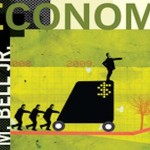I was sitting in a Starbucks with a friend, an agnostic, talking about faith and truth and I told him I could recommend some books on Christianity. “What would you like? An apologetics book on rational reasons for Christianity?”
“Nah, I’m not so interested in that,” he said.
In “worldview-terms,” my friend’s a “postmodernist,” someone who is suspicious of all grand meta-narratives about the world. Even though the two are conceptually distinct, on the popular level, postmodernism can often shade into “relativism,” believing that Truth, with a capital “T,” is relative to the person and that there is no one binding truth.
The standard apologetics training that I’ve received dictates that the proper response to relativism is to demonstrate how it is self-contradictory. The classic move is to “relativize the relativizer,” showing how the statement about truth’s relativity can be turned on itself and exposed as just another relative, truth-claim. If all truths are relative, so is the truth that all truths are relative. The hope is that the relativist would exclaim, “Wow, I’ve been leading an inconsistent worldview all along! Please show me the way.”
The problem with this response is that it assumes people today actually care about having an airtight, logically consistent worldview. It’s always been true that people’s identities and desires often trump worldview consistency, but it’s especially true today, when postmodernism has heightened the stakes of identity claims and eroded our faith in grand intellectual meta-narratives.
If it is not truth, then what do postmoderns value and how do we form an apologetics that begins by paying proper respect to those values? I want to expand on Peter Blair’s post yesterday on “The New Apologetic” by looking out how we should respond to a post-modern world.
When I think of my former classmates at Columbia University who subscribe to relativist views, they certainly do so out of a desire to be their own master, a desire that can be traced to the Garden of Eden. But they also do so out of a sense of injustice, because they associate capital T “Truth” with historical injustice. In the 19th century, it was True that Africans and Asians were somehow less human. In the early 20th century, it was True that women were not to be trusted with voting rights. It is no wonder then that the postmodern tends to suspects an Oz-like wizard behind the flashy projections of “Truth.” The standard apologetics’ explanation for relativism is often traced back to thinkers like Friedrich Nietzsche, but the real question is why his argument that the powerful define truth begins to seem more and more plausible.
As my friend, Laura, put it: “For me, a key element of the postmodern turn is the marginalized claiming the center. There is certainly a radical quest for validation, for new voices, for an end to oppression, and yes, for the power to bring these things about by renaming (or displacing) truth and the apparatuses that define it. But that is not nihilism. And it isn’t just Nietzsche. And it won’t go away or be sufficiently met by the Gospel unless we address the heart issues in this culture, not just the philosophical inconsistencies.”
The Gospel is a meta-narrative whose truth is not to be denied, but rather substantiated and backed up, not just by sophisticated arguments for truth and morality, but also by standing for the widow, the fatherless and the orphan, or whoever is weak and powerless amongst us. If not, it will simply be dismissed as just another self-serving Truth.













